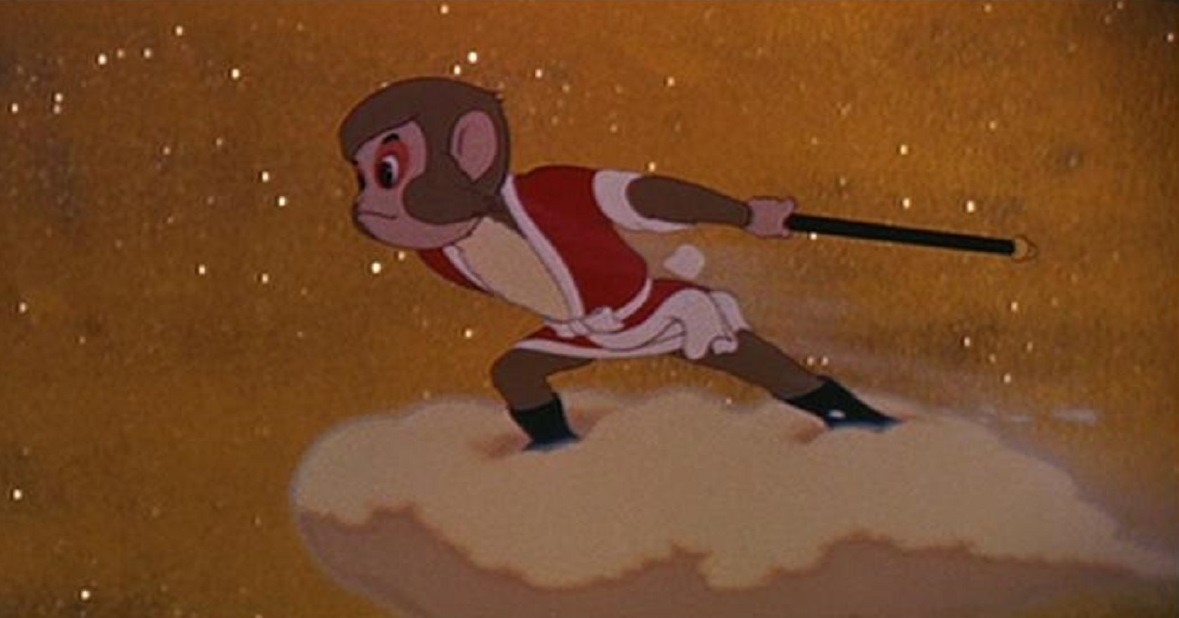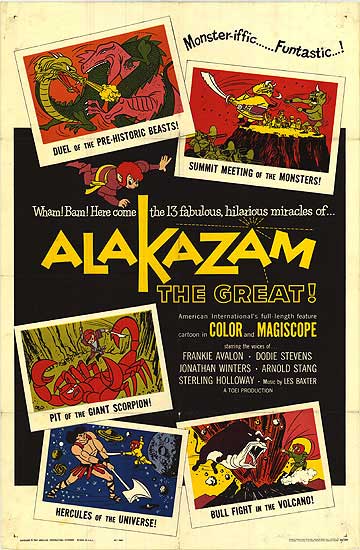(Saiyu-Ki)
Crew
Directors – Osamu Tezuka & Taiji Yabushita, Screenplay – Osamu Tezuka & Keinosuke Uekusa, US Version Written by Lee Kresel & Lou Rusoff, Producer – Hiroshi Okawa, US Version Produced by Rusoff, Music (US Version) – Les Baxter. Production Company – Toei.
Voices
(English Language Version)
Frankie Avalon (Alakazam Singing Voice), Dodie Stevens (Dee-Dee Singing Voice), Jonathan Winters (Sir Quigley Broken Bottom), Arnold Stang (Max Lulipopo), Sterling Holloway (Narrator)
Plot
The mischievous monkey Alakazam become the king of Majutsoland after winning a bet. In his arrogance, he forces Merlin, the world’s greatest magician, to teach him all there is about magic. Thus empowered, he goes and steals from the gods themselves. Angered, Amo, king of the gods, strips Alakazam of his powers and imprisons him inside a mountain to learn humility. Faced with the death of his beloved Dee-Dee, Alakazam pleads with the gods for her life and so is given a chance to earn her redemption by going on a pilgrimage with Amo’s son.
It is hard to see where Alakazam the Great attained the reputation that had itself listed by the Medved Brothers as one of the The Fifty Worst Movies of All Time (1977). Alakazam the Great was originally made in Japan by the legendary Osamu Tezuka. However, it was imported and dubbed by American International Pictures for English language release using a number of voice talents of the era, in particular pop stars Franke Avalon and Dodie Stevens and comedian Jonathan Winters.
The film a sentimental and mawkish in places – but if that is a crime then most Disney product is infinitely more guilty of. There are some rather sickly songs and the dubbing is not very good (an original restored version with subtitles is probably long overdue). On the plus side, the film comes with a sly sense of humour that makes it quite endearing. Certainly, few cartoons move with such fast-paced action. The film’s rare availability on video and existence as an internet bootleg has began to see it reevaluated as a lost early anime classic in recent years (although the Chinese animated version of the same classic story – see below – is by far the better film).

Alakazam the Great was one of the handful of films directed by Osamu Tezuka, the cult creator of numerous manga (and the person credited with the distinctive manga/anime look), the most famous of which was Kimba the White Lion (1965-6) and Astro Boy (1963-6).
Alakazam the Great is based on the epic 16th Century Chinese legend Journey to the West. The same traditional Chinese stories also formed the basis of numerous films and tv series:- as the Japanese film Monkey Sun (1940); the Chinese animated Princess Iron Fan (1941); the Chinese animated Princess Iron Fan (1941); the Chinese film Princess Iron Fan (1941) based on a partial segment of the story; the Japanese film Songoku: The Road to the West/The Adventures of Sun Wu Hung (1959); the Chinese animated film The Monkey King: Uproar in Heaven (1965), which is the best adaptation of the story to date; a trilogy of live-action films from Hong Kong’s Shaw Brothers Monkey Goes West (1966), Princess Iron Fan (1966) and The Cave of the Silken Web (1967); the popular the Japanese tv series Monkey (1978-9); a South Korean tv series Journey to the West (1982); a Japanese tv series Journey to the West (1993); director Jeffrey Lau’s two-part Hong Kong film A Chinese Odyssey Part 1: Pandora’s Box (1994) and A Chinese Odyssey Part 2: Cinderella (1995) with Stephen Chow as Monkey; a Japanese anime tv series Monkey Magic (1998); the US tv mini-series The Monkey King/The Lost Empire (2001) starring Thomas Gibson; the Hong Kong tv mini-series The Monkey King (2002); Jeffrey Lau’s remake of his earlier work A Chinese Tall Story (2005); a Japanese tv series Saiyuki (2006), which had one film spinoff with Saiyuki (2007); the US-made Jackie Chan/Jet Li vehicle The Forbidden Kingdom (2008); the modernised Emperor Visits the Hell (2012); Stephen Chow’s Journey to the West: Conquering the Demons (2013) and its sequel Journey to the West: Demon Chapter (2017); The Monkey King (2014) starring Donnie Yen and its sequels The Monkey King 2 (2016) and The Monkey King 3 (2018) with Aaron Kwok; and the Chinese animated Monkey King: Hero is Back (2015).
Trailer here

